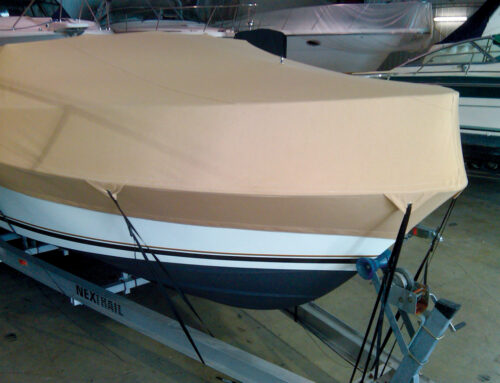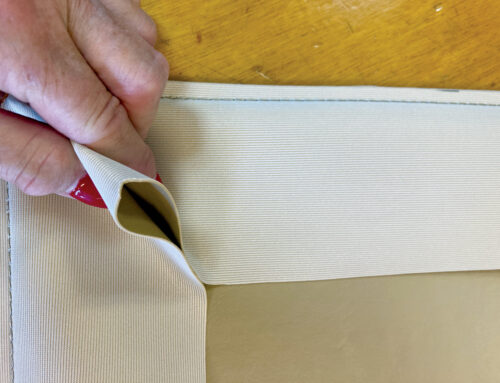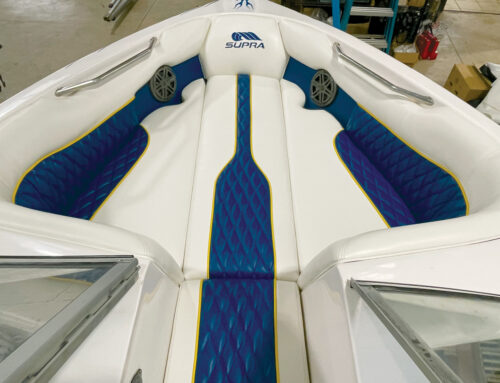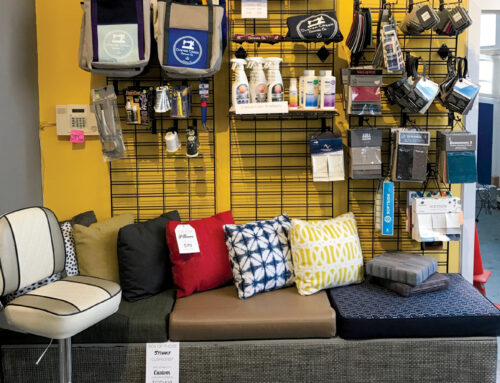Custom transportation upholstery offers profitable opportunities
Marine, hot rod and aircraft upholstery accelerates profits by capitalizing on customers’ custom needs.
By Abbie Yarger
In a world of mass production and one-size-fits-all, the factory-made box isn’t suitable for everyone. People are constantly transforming themselves or the things they own to stand out from the masses and make a lasting visual impact. Some people find that customizing their vehicles is the perfect means of breaking the molds of the assembly line. From yachts to classic cars, planes to 18-wheelers and virtually everything in between, upholsterers play an integral part in the niche markets created by those who seek custom transportation.
Planning your route
The decision to include a customizing component in your shop can come from many places: it can come from a want for creative freedom, the prospect of being your own boss, or to take advantage of an unfulfilled opportunity in your region. In 1988, Liz Diaz, owner of North Beach Marine Canvas, San Francisco, Calif., decided to quit repairing marine canvases to craft her own niche in fine yacht interiors. “I stopped doing what I don’t like and continued doing what I do like,” she says of the decision, which was prompted by a lack of upholsterers in the Bay Area specializing in sail and power yachts.
With the freedom to take her business in the direction she wanted, Diaz became more involved with the design aspects of the upholstery process (see “Upholstery merges with design”). “I really enjoy making the insides of boats beautiful,” she says. “I’m a rare person who takes your interior boat upholstery to the highest level I can take it to.” Diaz’s pride in her work allowed her to do the work she wants, successfully.
Dan Salinas, owner of Hot Rod Heaven, Nampa, Idaho, also enjoys his work in custom transportation. “I’m an avid car enthusiast and want to show the quality of my workmanship through my interiors,” he says of his classic car upholstery. “I think upholsterers should consider entering a niche market for the custom design, one-of-a-kind jobs and the opportunity to show more of their expertise.”
Like Diaz, Eric Walton and Devlin McKee of Custom Canvas Alaska, Anchorage, Alaska, decided to open their own unique upholstery shop after working in the industry for many years.
Initially focused on boat tops, Walton and McKee used reference materials from the upholstery community and the Industrial Fabrics Association International to expand their business.
They now make winter fronts—also known as grill covers—to protect vehicles from the frigid Alaskan air, travel covers for equipment, rock guards, windshield protectors and whatever else comes their way. “It’s pretty much limited to the customer’s imagination,” McKee says.
Terri Madden, owner of Sand Sea and Air Interiors Inc., San Juan, Puerto Rico, also ventured beyond marine upholstery when she discovered there were no facilities in the Caribbean that were certified by the Federal Aviation Administration (FAA) to service aircraft interiors.
“Do the research in your area and if there’s a need, go for it!” Madden says. She decided to seize the opportunity to enter the market and began the certification process (see “Learn to fly”).
Overcoming the obstacles
Like any new business endeavor, roadblocks will arise when getting into a new transportation market. Finding creative, effective solutions to problems and learning from mistakes will make for a better business overall.
“Following FAA procedures and the trail of paperwork took a bit of getting used to,” Madden says of her business expansion. “There is no room to operate in the gray; everything is either black or white.” Once her shop gained FAA approval, Madden relocated and renamed the business to better serve both the aircraft and marine markets.
National Flight Services Inc., another FAA-certified company that repairs airplanes in addition to providing interior services, has several facilities in the United States, one in Canada and offers upholstery services at the Swanton, Ohio, location. Rob Lucarelli joined the company as an interior specialist after departing the boat and classic car markets to work on airplanes.
Aside from having to study all of the FAA regulations, Lucarelli found the downtime—or duration the aircraft is kept at the facility for repairs—to be a somewhat difficult part of his transition into the aircraft market.
“When you have an expensive aircraft sitting on the ground, it’s not making any money,” Lucarelli says. “It’s all about scheduling. There’s really no room for excuses in this business.” With specialized markets come specialized bumps in the road, and time management is one that comes with the aircraft reupholstery industry.
Time crunches are also prevalent in the classic cars market, since many customers expect their vehicles to be ready for an upcoming car show. Salinas scouts out correct materials, machinery and hand tools needed to finish his work on time. “Not one job is the same,” he says. “Custom templates, patterns and new designs are handmade with every job.”
In order to effectively balance time and creativity, and keep track of the many aspects required to do a specific job, Diaz hired a project manager who makes sure everything gets to the proper place in a timely fashion. “You have to be more organized than you’ve ever been,” Diaz says of working on complex jobs. “It is problematic if you don’t.”
Word travels quickly
Getting the word out about your specialty services is one of the keys to keeping a custom business successful. Hot Rod Heaven uses a variety of tactics to advertise its custom car upholstery. Salinas emphasizes the need to market niche services to the correct group of individuals. He makes sure his employees attend car shows throughout the Western United States, to display work and get crucial one-on-one time with potential customers.
The company places ads in niche publications such as Good Guys, a magazine that covers the custom car market, prompting readers to call and ask about pricing. Salinas says the company’s website and MySpace page, both of which feature images of completed jobs, generate lots of positive comments from visitors.
Lucarelli has noticed an increased interest in the National Flight Services Inc. website, which has recently been revamped. But Lucarelli still achieves many sales by simply offering his services to customers who bring their airplanes in for other maintenance work. “I’ll go in, look around and see if it needs any upholstery work while it’s down,” he says. “That way, the customer doesn’t lose any downtime.” By doing this, Lucarelli helps the customer while getting business for his company.
Photos of completed projects on the walls of Custom Canvas Alaska inspire many customers to request services on other types of vehicles they own. The additional work McKee and Walton perform intrigues many customers who come into their shop. And when a satisfied customer walks out the door, McKee and Walton know that customer will help spread the word about their business. “Customers who are pleased with our work are proud to say where it was done,” Walton says. Most will agree that word-of-mouth is still the best form of advertising.
Final destination
McKee and Walton feel a sense of accomplishment from the assortment of projects they complete and their customers’ pride in the work they did for them. “We’ve got some pretty neat things up here,” McKee says, “and some people with some pretty crazy ideas.” Customers with out-there custom requests provide them with great opportunities for future work.
Lucarelli also enjoys the opportunities his work has presented for him. “My favorite thing about working in this market is getting to work on some of the nicest machinery humankind has ever produced,” he says. Being interested in his work directly translates to a beautiful finished product.
For Diaz, working with yacht interiors is all about passion. “You have to want to do it, and people have to want you to do it,” she says. “When you have the boat owner standing there glowing, that period of time is like a hole-in-one: pure satisfaction.” And satisfaction in your work is one of the most important things to keep your creativity flowing, your business growing, and customers coming back.
 TEXTILES.ORG
TEXTILES.ORG 






